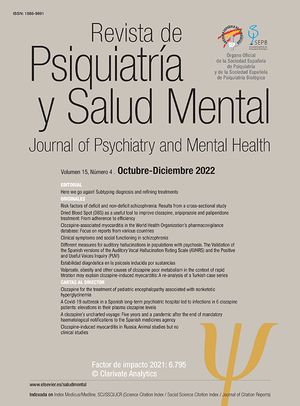The proxies used to compose cognitive reserve (CR) for patients of a first episode of psychosis (FEP) have varied in the literature. The development of FEP is linked to peripheral pathways of the central nervous system, yet despite this knowledge, no research has considered the introduction of biomarkers as proxies for CR. Meanwhile, schizophrenia has been linked to the metabolic system, indicating that alterations in the levels of biological parameters, in particular high-density lipoproteins (HDL), cause worse global functioning and cognitive impairment. For these reasons, the present study aimed to create a quantifiable and objective CR index that adjusts for the multifactorial nature of FEP.
Materials and methodsWe included 668 FEP patients and 217 healthy controls. Participants were assessed for sociodemographic information, years of education, employment status, premorbid IQ and biological parameters: waist circumference, hypertension, and levels of HDL, triglycerides, and glucose.
ResultsThe findings suggest that the years of education proxy showed correlational and higher relationship with HDL levels for both FEP patients (r=0.23, b=0.185) and controls (r=0.31, b=0.342). We found that the CR index composed of years of education and HDL levels showed a higher explanatory power for the phenomenon than the classical CR index composed of years of education, employment status and premorbid IQ.
ConclusionsThis article proposes an objective and quantifiable method to measure CR that is more the multifactorial nature of FEP.
Los indicadores utilizados para componer la reserva cognitiva (RC) para los pacientes de un primer episodio de psicosis (PEP) han variado en la literatura. El desarrollo del PEP está ligado a las vías periféricas del sistema nervioso central, pero, a pesar de este conocimiento, ningún estudio ha considerado la introducción de biomarcadores como indicadores de la RC. En cambio, la esquizofrenia ha estado vinculada al sistema metabólico, lo cual indica que las alteraciones de los niveles de parámetros biológicos, y en particular las lipoproteínas de alta densidad (HDL), causan un peor funcionamiento global y un deterioro cognitivo. Por tales motivos, el objetivo del presente estudio fue crear un índice de RC cuantificable y objetivo, que ajuste la naturaleza multifactorial del PEP.
Materiales y métodosIncluimos 668 pacientes de PEP y 217 controles sanos. Se evaluó a los participantes en términos de datos sociodemográficos, años de formación, situación laboral, IQ premórbido y parámetros biológicos: circunferencia de cintura, hipertensión y valores de HDL, triglicéridos y glucosa.
ResultadosLos hallazgos sugieren que el indicador de los años de formación reflejó una relación correlacional y superior con los niveles de HDL para los pacientes de PEP (r=0,23, b=0,185) y los controles (r=0,31, b=0,342), y encontramos que el índice de RC compuesto de los años de formación y los valores de HDL reflejó un poder explicativo superior para el fenómeno, en comparación con el índice de RC compuesto de años de formación, situación laboral e IQ premórbido.
ConclusionesEste artículo propone un método objetivo y cuantificable para medir la RC, que es más la naturaleza multifactorial del PEP.












